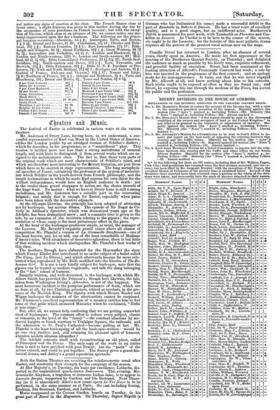(Arnim nub
The festival of Easter is celebrated in various ways at the various theatres.
Mr. Anderson of Drury Lane, having been, as we understand, a suc- cessful representative of Karl von Moor in the United States of America, edifies the London public by an abridged version of Schiller's Robbers' - which he describes, in his programme as a " magnificent" play. This version is neither more nor less than a strong melodrama of unusual length, and with little to distinguish it from several works which are as- signed to the melodramatic class. The fact is, that those very parts of the original work which are most characteristic of Schiller's mind, and which are therefore most interesting to the literary historian, are just those which have to be omitted in stage representation. The long metaphysi- cal speeches of Franz, containing the profession of the system of material- ism which Schiller in his youth derived from French philosophy, and the turgid declamations in which he made Karl express his own thirst for the wildest independence, would bore an English audience to death : yet to the reader these grand stoppages to action are the choice morsels of the huge feast. No matter : what we have at Drury Lane is still a strong melodrama, and. Mr. Anderson has a suitable part in the interesting brigand ; and surely that is enough for Easter, especially when pains have been taken with the decorative adjuncts. At the Olympic likewise, the principle has been adopted of attracting not by burlesque, but serious drama. The episode of Sir Roger de Co- verly in Addison's Spectator, which was dramatized years ago at the Adelphi, has been dramatized anew ; and a romantic tone is given to the tale, by an expansion of the incidents relating to the gipsies ; the repre- sentation of whose camp is the most picturesque effect in the piece.
At the head of the burlesque-producers stands, as usual, the manager of the Lyceum. Mr. Beverly's exquisite pencil raises above all chance of competition Mr. Planche's version of La Grenouille Bienfaisante—one of the least known, and, let us add, one of the least remarkable of Madame d'Anois's tales. With abundance of decorative splendour, there is but little of that striking incident which distinguishes Mr. Planche's best works of this class.
The brothers Brough have elaborated for the Haymarket the story which Fanny Easier first introduced to us as the subject of a ballet called The Gipsy, (ot La Gitana,) and which afterwards became far more cele- brated when reproduced by Mr. Balfe modified into the libretto of The Bo- hemian Girl. It is not a very kindly subject for burlesque, save that the gipsies can be treated as modern vagabonds, and talk the slang belonging to the " fast " school of humour.
Smartly written, and well-decorated, is the burlesque with which Mr. Albert Smith has provided the Princess's; though here likewise, the tale, taken from Washington Irving's Alhambra is not of the happiest. The most humorous incident is the pompous performance of feats, which are no feats at all, by two Christian prisoners, attired as acrobats, in the pre- sence of the Moorish King. The dignity with which Messrs. Keeley and Wigan burlesque the manners of the street-artists cannot be surpassed. Mr. Flexmore's excellent representation of a monkey entitles him to feel some of that pride which animated Mazurier when he exclaimed, " Enfm je suis singe !"
But, after all, we cannot help confessing that we are getting somewhat tired of burlesques. The constant effort to reduce every subject, classic or romantic, to the level of the "funny "—the constant allusions by me- dimval knights or Greek warriors to Trafalgar Square, the railroads, and the admission to St. Paul's Cathedral—become palling at last. Mr. Planche is the least burlesquing of all the burlesque-writers : would he go one step further, and, still retaining his pleasant spirit of humour, abandon modern allusion altogether ?
The Adelphi contents itself with reconstructing an old piece, called 0' Flannigan and the Fairies. The only copy of the work in an entire form is said to have perished with poor Power; but the "parts" of the actors existed, and could be put together. The Surrey gives a grand his- torical drama, and Astley's a grand equestrian spectacle.


























 Previous page
Previous page